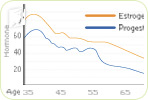The growth cycle of hair can be broken down into three stages. The anagen phase is when the hair grows. The telogen phase is when the hair rests, and when the hair falls out and is replaced by new hair is the end of the telogen phase. Medication can have various effects on hair, like changing its color, making it curly, or causing hair loss. Fortunately, these effects tend to subside when medication is stopped. It is important to be aware of all of the possible side effects of your medications before taking them.
Hair Loss
There are several medications can cause hair loss by disturbing the normal cycle of hair growth. They can cause hair thinning and loss because they are damaging to the hair follicles. There are two types of hair loss due to medication, telogen effluvium and anagen effluvium. Telogen effluvium is the most common form of drug induced hair loss, and typically occurs two to four months after taking a drug.
Anagen effluvium is associated with severe chemotherapy drugs, and typically causes complete hair loss on the head, eyelashes, and eyebrows. Chemotherapy drugs can also affect hair texture and shade. These drugs work to kill cancer cells, but also affect healthy hair, and can cause hair loss as quickly as a few weeks to one month after beginning treatment. Hair tends to grow back 3 - 10 months after treatment has stopped.
Medications
Common medications that can affect your hair are:
Oral contraceptives. Oral contraceptives can affect hair because they influence hormone levels. Birth control pills tend to change hair after medication is stopped.
Blood thinners (anticoagulants). Blood thinners have been linked to hair loss because they can damage the hair follicles.
Beta blockers. Beta blockers - which are used to treat high blood pressure and anxiety - have been known to cause thinning hair.
Antidepressants. Various antidepressants have been known to cause hair loss.
Acne medication. Some acne medications affect keratin, the substance that hair is made up of, which can change the density, appearance, and color of hair.
Epilepsy medication (anticonvulsants). Epilepsy drugs can cause hair loss and make hair curly.
Psoriasis medication. Psoriasis is a condition that results in scaly patches all over the skin. Psoriasis medication works by slowing down skin cell production, but also affects hair production. It slows hair growth and can also cause curling and kinking.
Many people do not consider medication when experiencing changes in hair growth, texture, or color. It is important to be aware of the possible side effects before taking any prescription medication. Hair changes tend to subside once medication is stopped, so if you are experiencing negative side effects, talk to your doctor about switching medications.
For more information about hair loss treatments click on the links.
Sources
- National Institutes of Health. (2014). Hair Loss. Retrieved October 22, 2014, from http://www.nlm.nih.gov/medlineplus/hairloss.html
- Office on Women's Health. (2008). Skin and Hair Health. In: The Healthy Woman: A Complete Guide for All Ages. Retrieved October 22, 2014, from http://www.womenshealth.gov/publications/our-publications/the-healthy-woman/skin_hair.pdf




